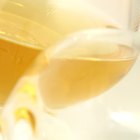
Whether you're keeping a few bottles for a future special occasion or investing in liquor for resale, storing bottles of spirits such as whisky, rum, gin or vodka over a long period is relatively simple. To make sure that a bottle lasts for years, however, it's necessary to understand the basic principles of storage.
In for the Long Haul
While wine collectors know that their investments are still maturing in the bottle, liquor owners don't get the same benefit from holding onto bottles for a long time -- or the same risks. Because of the high alcohol content of distilled spirits, they remain stable indefinitely, neither improving in character nor deteriorating. However, to remain stable, bottles of liquor have to be kept under the right storage conditions.
Keep Them in the Dark
Liquor bottles should be kept at room temperature, away from direct sunlight or other sources of ultraviolet light. Light can bleach the label of a bottle, causing it to lose its resale value. Darker liquors such as whiskey may also lose some of their color through prolonged exposure to sunlight. Some whiskey distillers claim that natural colors fade more slowly than artificial colors, but it's still advisable to avoid direct sunlight.
Preserving an Open Bottle
Once a bottle of liquor has been opened, however, the clock starts ticking. Expert Ethan Kelley estimates that an opened bottle will only retain its flavor and character for six months to a year. Because contact with air causes the liquor to degrade, reducing the alcohol's exposure to air can help preserve it. This can mean decanting the liquor into a smaller bottle or even replacing some of the air in the bottle with an inert gas.
Don't Break the Seal
Unopened bottles of liquor are immune to the negative effects of contact with the air only as long as they stay properly sealed. Regular inspection will spot cases in which the cork might be deteriorating. A decreasing level in the bottle indicates that evaporation is occurring. Although liquor, unlike wine, does not need to be stored horizontally to keep the cork wet, occasionally upending the bottle can help make sure that the cork does not dry out.
Related Articles

How Long Can a Bottle of Vodka Last ...

Does Brandy Ever Go Bad?
How Long Can You Keep an Open Bottle of ...

Why Does Wine Not Expire?

How to Store Cognac

Should I Store Red Wine Horizontally or ...

Why Is White Wine Turning Brown in a ...

Does a Chilled Champagne Bottle Need to ...

Can Drinking Old Vodka Hurt You?

How to Make Homemade Wine Taste Better

What Is the Highest Proof Vodka?

How Long Should a Wine Collector Keep a ...

Alcohol Content: Proof vs. Percentage ...

What Does VSOP Mean?
What Is the Difference Between 80 & 100 ...

What Is the Highest Proof Tequila?

What Happens to the Alcohol ...

How to Make Alcohol at Home

What Is the Difference Between Wine & ...

How to Clean Marks From Nike Mercurial ...
References
Writer Bio
Dr James Holloway has been writing about games, geek culture and whisky since 1995. A former editor of "Archaeological Review from Cambridge," he has also written for Fortean Times, Fantasy Flight Games and The Unspeakable Oath. A graduate of Cambridge University, Holloway runs the blog Gonzo History Gaming.
Photo Credits
Ryan McVay/Photodisc/Getty Images